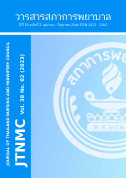Effects of the Perceived Self-Efficacy Enhancement Program Through Quality Food Consumption on Weight Retention Among Postpartum Mothers
DOI:
https://doi.org/10.60099/jtnmc.v38i02.262656Keywords:
postpartum weight retention, food consumption self-efficacy promotion program, self-efficacyAbstract
Introduction Postpartum weight retention refers to the persistent weight gain experienced during pregnancy that remains after childbirth, affecting physical and mental health of mothers. Key factors contributing to postpartum weight retention include dietary consumption behaviors and the perception of self-efficacy in controlling food intake. Promoting self-confidence in postpartum women's dietary choices is crucial in encouraging appropriate food consumption and minimizing the risk of postpartum weight retention.
Objective To compare the average weight retention within the experimental group before and after the intervention, and to compare the weight retention between the control and experimental groups after the intervention.
Design This study employs a quasi-experimental design with two-group pre-test and post-test.
Methodology The participants included 66 primigravida postpartum mothers who were at 6 weeks post-childbirth and receiving postpartum check-up services at the postpartum and family planning clinic at a hospital in Nakhon Si Thammarat Province. Data were collected from July to November 2022. Participants were purposively selected according to inclusion criteria and then matched paired into control and experimental groups, with 33 participants in each group. The experimental group underwent a 10-week perceived self-efficacy enhancement program focused on improving the quality of food consumption, in addition to receiving routine care. The control group received routine care. The intervention consisted of the perceived self-efficacy enhancement program through quality food consumption, developed by the researcher based on the concept of self-efficacy, and delivered through the short message service. Qualified experts evaluated its content validity, resulting in a content validity index (CVI) of 1. Data collection instruments included: 1) a personal information questionnaire, 2) a body weight record, 3) a digital weighing scale, 4) a food consumption recording form for 24-hour recall, and 5) a food consumption self-efficacy assessment scale developed by the researcher. This scale demonstrated high content validity, with a CVI of 1. The scale also revealed good reliability, with a Cronbach's alpha coefficient of .70. Data were analyzed using descriptive statistics, Independent t-test, Chi-square test, Wilcoxon Signed Rank test, and Mann-Whitney U test. Results The average postpartum weight retention in the experimental group after the program (M = 5.01, SD = 1.89) was lower than that before the program (M = 6.24, SD = 1.31), with a statistically significant difference (Z = -3.587, p < .001). Moreover, the average postpartum weight retention in the experimental group was significantly lower than that of the control group (M = 6.51, SD = 1.71), with a statistically significant difference (Z = -2.873, p = .004).
Recommendation Nurse-midwives could apply this program to enhance perceived self-efficacy in postpartum mothers who experience weight retention and lack confidence in consuming quality food by reassuring them during the postpartum period, and closely monitoring their food consumption behaviors and postpartum weight retention.
Downloads
References
Lertbunnaphong T. Maternal body weight and pregnancy:factors that obstetricians may overlook. Siriraj Medical Bulletin 2008;1(2):81-90. (in Thai)
Institute of Medicine (US) and National Research Council (US) Committee to Reexamine IOM Pregnancy Weight Guidelines. Weight Gain During Pregnancy: Reexamining the Guidelines. Rasmussen KM, Yaktine AL, editors. Washington (DC): National Academies Press (US); 2009. doi:10.17226/12584 PubMed PMID: 20669500.
Gunderson EP, Abrams B. Epidemiology of gestational weight gain and body weight changes after pregnancy. Epidemiol Rev. 2000;22 (2):261-74. doi: 10.1093/ oxfordjournals.epirev.a018038 PubMed PMID: 11218377.
Polheber A, Feutz K. Implementing an Evidence-Based Outpatient Program to Reduce Postpartum Weight Retention. Nurs Womens Health. 2017;21(4):284-295. doi: 10.1016/j.nwh.2017.06.008 PubMed PMID: 28784209.
Wangchom S, Xuto P, Kantaruksa K. Physical Activity, Dietary Quality, Breastfeeding and Weight Retention Among 6 Month Postpartum Mothers. Nursing Journal CMU 2019;46(4):94-107. https://he02.tci-thaijo.org/index.php/cmunursing/article/view/230282 (in Thai)
Rooney BL, Schauberger CW. Excess Pregnancy Weight Gain and Long-Term Obesity: One Decade Later. Obstet Gynecol. 2002;100(2):245-52. doi: 10.1016/s0029-7844(02)02125-7 PubMed PMID: 12151145.
Endres LK, Straub H, McKinney C, Plunkett B, Minkovitz CS, Schetter CD, et al. Postpartum Weight Retention Risk Factors and Relationship to Obesity at 1 year. Obstet Gynecol. 2015;125 (1):144-152. doi: 10.1097/AOG.0000000000000565 PubMed PMID: 25560116.
Molyneaux E, Poston L, Ashurst-Williams S, Howard LM. Obesity and mental disorders during pregnancy and postpartum: a systematic review and meta-analysis. Obstet Gynecol. 2014 ;123 (4):857-67. doi: 10.1097/AOG.0000000000000170 PubMed PMID: 24785615.
Bandura A, Freeman WH, Lightsey R. Self-efficacy: The exercise of control. J. Cogn. Psychother 1997;13:158-166.doi.org/10.1891/0889-8391.13.2.158
Chang MW, Schaffir J, Brown R, Wegener DT. Mediation by self-efficacy in the relation between social support and dietary intake in low-income postpartum women who were overweight or obese. Appetite. 2019;140:248-254. doi: 10.1016/j.appet.2019.05.031 PubMed PMID: 31141706.
Lui J, Wilcox S, Hutto B, Mc-Grievy GT, Wingard Ellen. Effects of a lifestyle intervention on postpartum weight retention among women with elevated weight. HHS Public Access. 2022;30(7), 1370-1379. https://doi:10.1002/oby.23449.
Institute of Nutrition Mahidol University. Computer program for calculating nutrients INMUCAL-Nutrients V2 NB1 series database [computer program]. (2007). (in Thai)
Sakulnitiwat N, Yusamran C, Thananowan N. Predictive Factors of Postpartum Weight Retention. Journal of The Royal Thai Army Nurses. 2019; 20(2), 112-122. https://he01.tci-thaijo.org/index.php/JRTAN/article/view/182784 (in Thai)
Lipsky LM, Strawderman MS, Olson CM. Weight-related self-efficacy in relation to maternal body weight from early pregnancy to 2 years post-partum. Matern Child Nutr. 2014;12 (3):569-78. doi: 10.1111/mcn.12149 PubMed PMID: 25244078.
Tolly KD, Skinner D, Nembaware V, Benjamin P. Investigation into the use of short message services to expand uptake of human immunodeficiency virus testing, and whether content and dosage have impact. Telemed J E Health. 2012;18(1):18-23. doi: 10.1089/ tmj.2011.0058 PubMed PMID: 22150712
Downloads
Published
How to Cite
Issue
Section
License
Copyright (c) 2023 The Journal of Thailand Nursing and Midwifery Council

This work is licensed under a Creative Commons Attribution-NonCommercial-NoDerivatives 4.0 International License.








